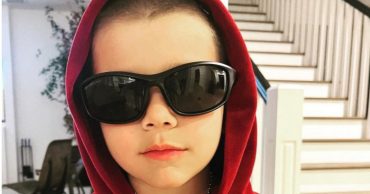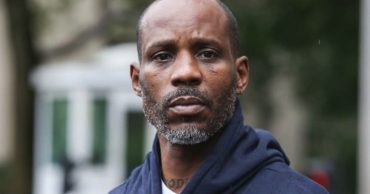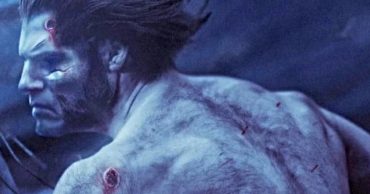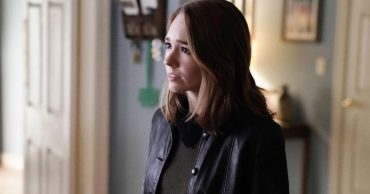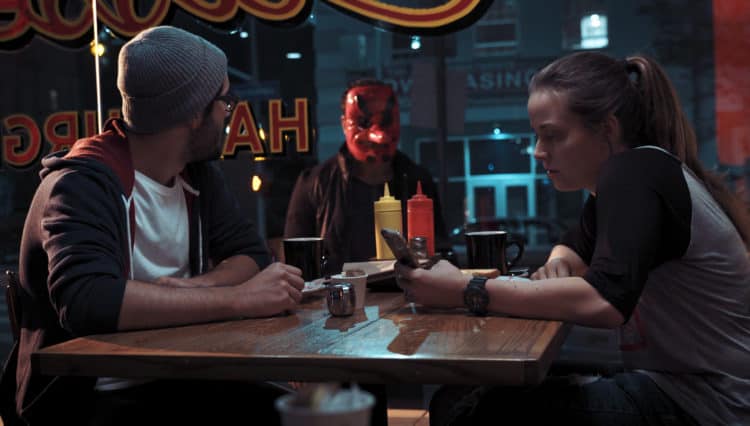
Something very interesting is happening this summer in the horror world. Low budget horror films are becoming box office hits. Not just one, but many. Paving the way, IFC Midnight’s The Wretched, which now belongs to a small group of films that have topped the U.S. box office for five weekends in a row, others in this club include Titanic and Avatar. Other titles seeing successful runs since the lock down began, Quiver Distribution’s Becky, IFC Films’ Relic and Global View Entertainment’s found footage horror/thriller Followed. Because of it’s successful drive-in theater run, it was also recently announced that MPI Media Group has acquired the international sales rights to picture. To learn more about Followed, we spoke with the film’s talented composer Jason Soudah. Below he talks about everything from his background in music to what sort of research he did to find the right tone for Followed. You can listen to Soudah’s full score here.
-You were born in Tokyo and of Irish/Cypriot descent. Do you think your background has influenced your musical palate?
I think it has. I haven’t really necessarily got a blatantly Irish or Cypriot/Middle Eastern sound, but I feel like there are some elements of the melodies I write, especially when singing (which I often do as a process to write melodies for scores, even when they will end up on an instrument, in order to free me from keyboard habits I might fall into) which are definitely more Irish or Cypriot/Middle Eastern. Also, I definitely remember clients occasionally telling me a melody sounds “weird” to them, or “a bit Arabic” and I think that it is in my musical language and DNA for sure… Most of the music I grew up on was Western, but I definitely heard a lot of Irish folk music and Greek and Arabic music in my days! Many of my favorite bands/singer-songwriters are Irish as well. As far as Tokyo’s influence on me, I was living there until I was around 10, during the early 80s, and I played some video games and I think those soundtracks influenced me a lot, especially on projects which call for an 80s synth sound! I also feel like the bright neon-lights are permanently burned into my subconscious!
-When did you know you wanted to become a film composer?
I remember wanting to start playing the piano since I was probably 4 years old, since my older cousin Susan used to play and she would get all of us cousins to put on shows for the family when we had big get-togethers – I think that’s when it started… Pretty early on, I wanted to write music and was a bit inpatient when it came to learning to read music. I wanted to play by ear! I was so lucky to have an awesome piano teacher around the time I was 10 or so (Mike Twisse – in the UK in Berkshire) who adapted to me and taught me about chords and chord sequences, helped me develop my ear and my songwriting skills and took me seriously even at that age! He got me on the road to producing as well, encouraging my very supportive parents to get me a “proper” keyboard (KORG M1) and eventually Cubase on a PC. I loved the technology as well as the music (my Dad worked in computers/systems in his early days in the banking/finance industry).
So, I was firstly writing songs, and playing in bands and so on. I can’t remember the exact moment when I knew I wanted to be a composer, but I always felt that was where I wanted to end up. I loved movies and movie music from a young age. I remember when I was making an album with my band in Weed, California (yes, really!) with one of my idols, awesome producer Sylvia Massy, and sensational engineer Michael C. Ross, and they both said to me that I should be writing music to movies, based on what they were getting from the songs we were working on together. I said that I would love to but I can’t read music very well, and don’t know the first thing about orchestration, and they were like “they have people on the team who will do that!” – so I looked into it further, and I remember being particularly encouraged by an interview I read of Hans Zimmers where he talks about how much he uses technology (also Cubase!) and although he can read music, it’s more about playing with samples and virtual instruments through the keyboard, so that made me feel like it was more possible.
I remember I had made contact with someone at ASCAP at SXSW at a panel (Jennifer Knoepfle) and she was talking about how ASCAP doesn’t just collect royalties but also provides career advice and support, and she kindly introduced me to some other people at ASCAP – Jason Silberman in New York, and also Ross Gautreau in London. Jason was super-supportive in my singer/songwriter days when I would perform in New York, and Jennifer also would take the time to meet and give me feedback on my music when I was in LA – ASCAP has been a huge asset to me. When I met Ross in London and told him about what was happening with my singer/songwriter career, I also mentioned that I wanted to get into composing for media. He then connected me with the right person for that, Simon Greenaway, also at ASCAP in London – I met with Simon and we hit it off, and he mentioned Remote Control Productions (Hans Zimmer’s studios in Santa Monica, CA) and said that if there was any way I could get in there, it would be a fantastic way to get started and to learn a lot. I have mentioned in some other recent interviews how I serendipitously ended up getting an internship at Remote Control, so please check online for that, as I am realizing that my answers are getting pretty long! I was so happy to be able to tell Simon “I’m in!” ASCAP continues to be a great resource for me today and I thank them so much, especially Jennifer Harmon and Michael Todd.
-How did you initially get involved with Followed?
I was initially brought in by writer of Followed, and my friend, Todd Klick. We met in LA at a mutual friend’s gathering about 10 years ago, and he was always really supportive of my ventures in music. When Todd was teamed up with Antoine Le (Director) and Matthew Ryan Brewbaker (Producer/Editor), he said I was the first who came to mind when they started talking about the music. So Todd brought Antoine and Matthew to my studio and we had a good chat about the movie, and once I had watched it, I played them my initial suite of musical ideas, and they were into it, so we got going!
-What would you like audiences to know about your score for the film that they don’t already?
So I and fellow composers/songwriters will often ask for feedback on music we are working on from colleagues and friends, but for Followed, I really didn’t want to be swayed off course, or to have any seeds of doubt planted, even if they were from a place of love and encouragement, so the only people that heard the music as I was working on it were Antoine and Matthew (and my dogs and darling wife course!) – I wanted to make sure our vision made it through to the final cut and we stuck to our guns!
-A lot of critics are praising Followed for breathing new life into the found footage genre. Are there any “rules” you had to follow when scoring this subgenre?
I think we might have broken a “rule” to start with – we decided that although this was found footage, the footage was found by a team of producers, and the producers wanted the movie to be an immersive, cinematic experience – this gave me license to score it as I would a bigger budget movie (apart from not having a massive orchestra…), while we did reserve more indie-sounding tracks for the vlogs, as if the editor of those grabbed music from free/cheap services on line – so hopefully we struck a happy medium!
-The film originally premiered at the Burbank Film Festival in 2018. Since the first premiere, to its recent release did you have to re-score anything?
I didn’t have to re-score anything, but they may have had to edit the music to any picture changes that may have done since then (and that would have been handled by our excellent re-recording engineers and sound designers from figure8sound, Pyata G. Penedo and Christopher J. Thomas (thanks guys!!)
-Derby Zero Six Productions recently released the film’s score. What was the most challenging track on the album for you create? Why?
I think the most challenging was “Problems feat. Kingidiom” – this is a banging hip hop/rock track that hits you as the movie ends, and brings us into the end credits. I wanted to infuse both of the main musical themes into the track, as well as it having punchy drums and in-your-face vocals. The arrangement took some work (not only because the two themes are in different keys and tempos, and time signatures), as we wanted the main elements to be the vocals, drums, and bass, whilst maintaining some of the size of the score in the back. It was also a challenge as Kingidiom was recorded remotely and then I was sent the files (we were working as if we were in a pandemic… ahead of our time!), but he did great and sent me everything I needed to assemble the track – I would send my drafts to him for feedback, and it was a true collaboration. Antoine and Matthew were into it thankfully, and at the screenings of the movie I have been to, the fans seem energized and excited by this song. I love any opportunity to merge the songwriting and composing worlds together.
-The film is based on a Korean Elevator Ritual, did you do any research about this ritual and get any inspiration for the score from this?
As soon as I heard about the Korean Elevator Ritual in the movie, I googled it, and was freaked out by what I found!! It is scary stuff, especially the stories of people claiming that it actually works…
The main theme was based on an idea I had to translate the Elevator Ritual into a melody – the ritual involves going up and down an elevator in a specific sequence of floors, and I allocated floor numbers to notes in a scale, such that when I played the Elevator Ritual floor numbers in order, I had my melody. I presented this as part of my initial suite to Antoine, Matthew and Todd, and thankfully they were really into both the idea and the music! For the other melodic theme, which I called “Come Home,” which centers around our lead Mike and his partner Jess’s relationship as well as the relationship between our main characters, I reversed the main theme’s melody, since in the Korean Elevator Ritual you are supposed to reverse the order of floors you visit in order to get back to our world.
-What did you learn, musically, from working on Followed?
Especially with this having been my first feature movie as lead composer, I am happy that I learned to trust my instincts, and to work as a team with the film makers. On projects where I write “additional music,” even though it can be creative, you have to filter your ideas in order to be coherent with the sound and goals of the lead composer and the rest of the music team. So I really enjoyed being out front on my own and seeing what I could make happen – leap and the net will appear!
-Since the film has done so well at the box office, are there any talks for a sequel?
Yes!! It is on the cards for sure!!
 Follow Us
Follow Us
